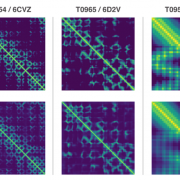by Natasha Lomas
Google-owned AI specialist, DeepMind, has claimed a “significant milestone” in being able to demonstrate the usefulness of artificial intelligence to help with the complex task of predicting 3D structures of proteins based solely on their genetic sequence.
Understanding protein structures is important in disease diagnosis and treatment, and could improve scientists’ understanding of the human body — as well as potentially helping to support protein design and bioengineering.
Writing in a blog post about the project to use AI to predict how proteins fold — now two years in — it writes: “The 3D models of proteins that AlphaFold [DeepMind’s AI] generates are far more accurate than any that have come before — making significant progress on one of the core challenges in biology.”
There are various scientific methods for predicting the native 3D state of protein molecules (i.e. how the protein chain folds to arrive at the native state) from residual amino acids in DNA.
But modelling the 3D structure is a highly complex task, given how many permutations there can be on account of protein folding being dependent on factors such as interactions between amino acids...
Read the full story on TechCrunch's website using the link below.

